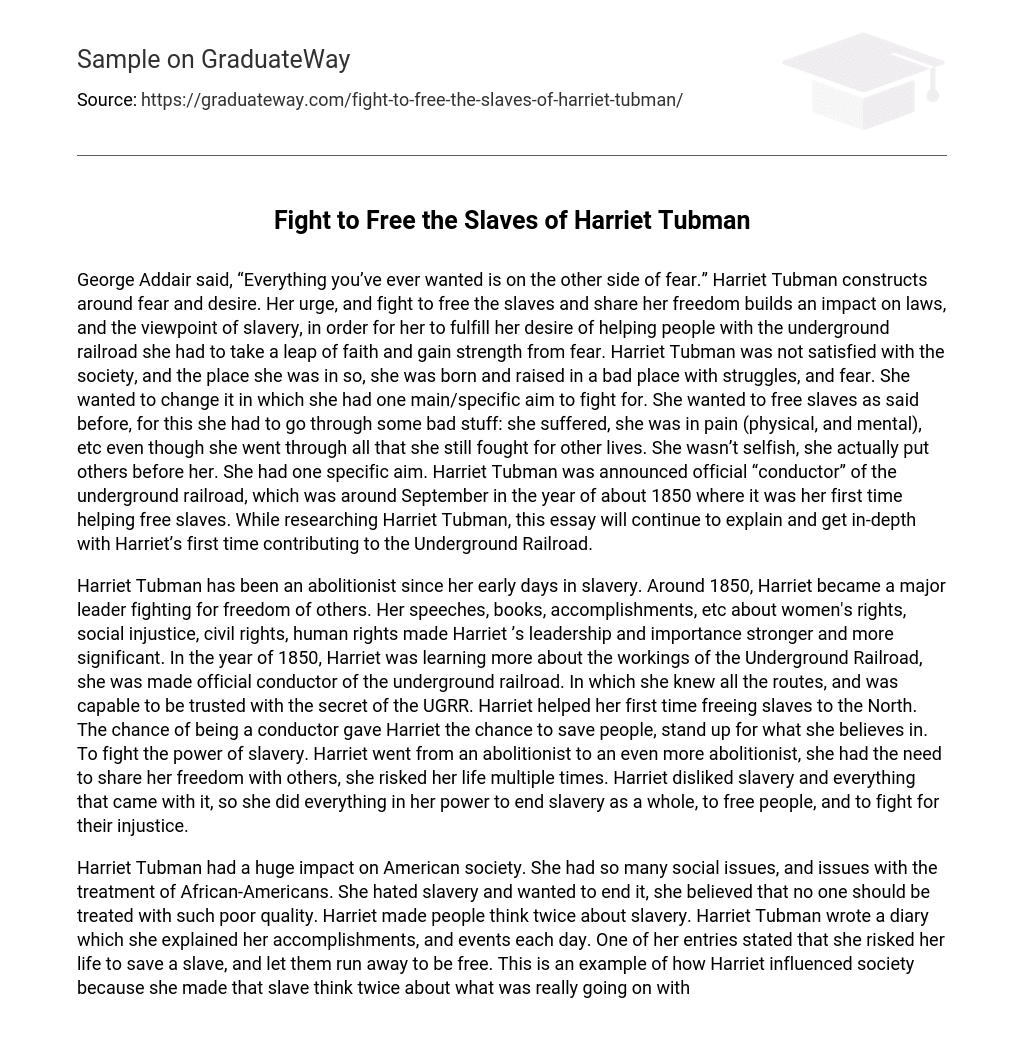George Addair said, “Everything you’ve ever wanted is on the other side of fear.” Harriet Tubman constructs around fear and desire. Her urge, and fight to free the slaves and share her freedom builds an impact on laws, and the viewpoint of slavery, in order for her to fulfill her desire of helping people with the underground railroad she had to take a leap of faith and gain strength from fear. Harriet Tubman was not satisfied with the society, and the place she was in so, she was born and raised in a bad place with struggles, and fear. She wanted to change it in which she had one main/specific aim to fight for. She wanted to free slaves as said before, for this she had to go through some bad stuff: she suffered, she was in pain (physical, and mental), etc even though she went through all that she still fought for other lives. She wasn’t selfish, she actually put others before her. She had one specific aim. Harriet Tubman was announced official “conductor” of the underground railroad, which was around September in the year of about 1850 where it was her first time helping free slaves. While researching Harriet Tubman, this essay will continue to explain and get in-depth with Harriet’s first time contributing to the Underground Railroad.
Harriet Tubman has been an abolitionist since her early days in slavery. Around 1850, Harriet became a major leader fighting for freedom of others. Her speeches, books, accomplishments, etc about women’s rights, social injustice, civil rights, human rights made Harriet ’s leadership and importance stronger and more significant. In the year of 1850, Harriet was learning more about the workings of the Underground Railroad, she was made official conductor of the underground railroad. In which she knew all the routes, and was capable to be trusted with the secret of the UGRR. Harriet helped her first time freeing slaves to the North. The chance of being a conductor gave Harriet the chance to save people, stand up for what she believes in. To fight the power of slavery. Harriet went from an abolitionist to an even more abolitionist, she had the need to share her freedom with others, she risked her life multiple times. Harriet disliked slavery and everything that came with it, so she did everything in her power to end slavery as a whole, to free people, and to fight for their injustice.
Harriet Tubman had a huge impact on American society. She had so many social issues, and issues with the treatment of African-Americans. She hated slavery and wanted to end it, she believed that no one should be treated with such poor quality. Harriet made people think twice about slavery. Harriet Tubman wrote a diary which she explained her accomplishments, and events each day. One of her entries stated that she risked her life to save a slave, and let them run away to be free. This is an example of how Harriet influenced society because she made that slave think twice about what was really going on with the slave owners and she fought for that slave. When Harriet was succeeding with her goals, freeing slaves and giving them their freedom, slave owners disliked her running around freeing slaves so they put up a wanted (dead or alive) poster for 40k, all because she was standing up for what she believes in. This is an example of how she influenced society because she influenced people to stand up for what they believe in because if you’re waiting too long you will never do it and you’ll be disappointed in yourself. Harriet had many influences on society, many good things that will forever be looked back on in time.
This explained and got in-depth with Harriet’s first time contributing to the Underground Railroad, and freeing the enslaved people. If you didn’t already know the underground railroad is a secret network of routes and safe houses, used by African-American slaves to escape into free states, to have better living conditions. Harriet Tubman’s impact on people forced them to think twice about slavery, to see different views on it. Harriet Tubman once said, “I grew up like a neglected weed – ignorant of liberty, having no experience of it.”





